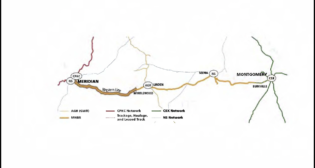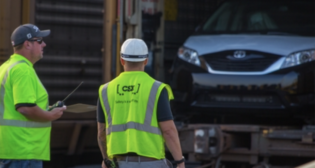
RBN Energy: CBR to Northwest refineries resilient
Written by William C. Vantuono, Editor-in-ChiefNorthwest crude oil refiners are still shipping significant volumes of crude from North Dakota’s Bakken region, RBN analyst Sandy Fielden discusses in “Slow Train Coming: Crude By Rail To Northwest Refineries Still Resilient.”
Following are highlights from Fielden’s report, which can be accessed by clicking HERE:
• Most of the crude by rail (CBR) shipments to refineries in Washington State are ex-North Dakota from where rail freight costs are more than $10/Bbl. Bakken crude from North Dakota competes at Washington refineries with Alaska North Slope (ANS) shipped down from Valdez. Back in 2012, ANS prices were more than $20/Bbl higher than Bakken crude, easily covering the rail cost. In 2016, so far the ANS premium to Bakken has averaged well below the $10/Bbl freight cost, making CBR shipments uneconomic. But, Northwest refiners are still shipping significant volumes of crude from North Dakota.
• The West Coast market is somewhat different than the rest of the U.S., and CBR economics are closely tied to the difference between inland domestic crude prices linked to WTI and West Coast prices for ANS crude delivered to Long Beach, Calif. ANS is the default crude processed by most West Coast refineries and before shale crude largely competed with imported crudes was priced against international benchmark Brent. When Bakken crude from North Dakota is selling at a significant discount to ANS and Brent (as it was in 2012), the additional cost of rail freight to West Coast refineries is more than justified.
• There are five refineries in the Northwest, all located in Washington State with a total operating capacity of about 647 Mb/d. These refineries all process ANS crude shipped down from Valdez by tanker. There is no pipeline network to deliver U.S. inland crude to the Northwest. The only traditional source of supply aside from ANS has been imports (mostly from Asia) or limited supplies of Canadian crude reaching the Northwest via the 300 Mb/d Kinder Morgan Trans Mountain Express pipeline from Edmonton. Since the advent of shale crude, each of these refineries has built or attempted to build a CBR unloading terminal mostly designed to receive deliveries of Bakken crude from North Dakota, the nearest shale basin to the Northwest. The table below lists the five refineries. . . . The only terminal not yet built is Shell Puget Sound that is currently tied up in an Environmental Impact Study. The other terminals are all operating. Bakken crude was heavily discounted in 2012 and 2013 such that it was cheaper to process than ANS. However CBR economics between North Dakota and Washington State have turned upside down in the past year, making Bakken crude more expensive than ANS.
• In a similar way to what we saw at East Coast destinations, CBR volumes being shipped to Northwest refineries remained quite resilient in the face of poor economics. We don’t know for sure, but this resilience is likely due to refiners having made term “take-or-pay” commitments to rail load and unload terminals and to leasing rail tank cars. These contracts mean that they have to pay variable transportation costs even if they don’t ship crude. They therefore continue to do so, even though the economics are questionable at best. The available CBR movement data bears out this resilience.
• There have been a number of plans put forward for terminals at port locations on the Washington and Oregon Coastline. These plans, some of them involving conversion of existing smaller facilities, were made when price differentials were considerably more favorable and midstream companies hoped to ship CBR from North Dakota as well as from Canada to tidewater unload terminals from where the crude could be shipped by barge to California refineries (in the case of Bakken crude) or by tanker to overseas markets (Canadian crude). So far, none of these projects have made it through the permitting process, with local environmental opposition increasing the scrutiny after a series of deadly accidents involving CBR in 2013 and 2014. Of the seven projects in RBN’s database, only one appears to be moving forward, although it is tied up in permitting: Vancouver Energy, the Tesoro/Savage joint venture that proposes building a 360 Mb/d rail unload terminal at the Port of Vancouver, Wash. It is unclear if the Vancouver Energy project will ever be built in the current price environment. In January 2016 Global Partners cancelled a similar project at Clatskanie, Ore., due to poor economics and will now only use the terminal for ethanol.




![“This record growth [in fiscal year 2024’s third quarter] is a direct result of our innovative logistic solutions during supply chain disruptions as shippers focus on diversifying their trade lanes,” Port NOLA President and CEO and New Orleans Public Belt (NOPB) CEO Brandy D. Christian said during a May 2 announcement (Port NOLA Photograph)](https://www.railwayage.com/wp-content/uploads/2024/05/portnola-315x168.png)